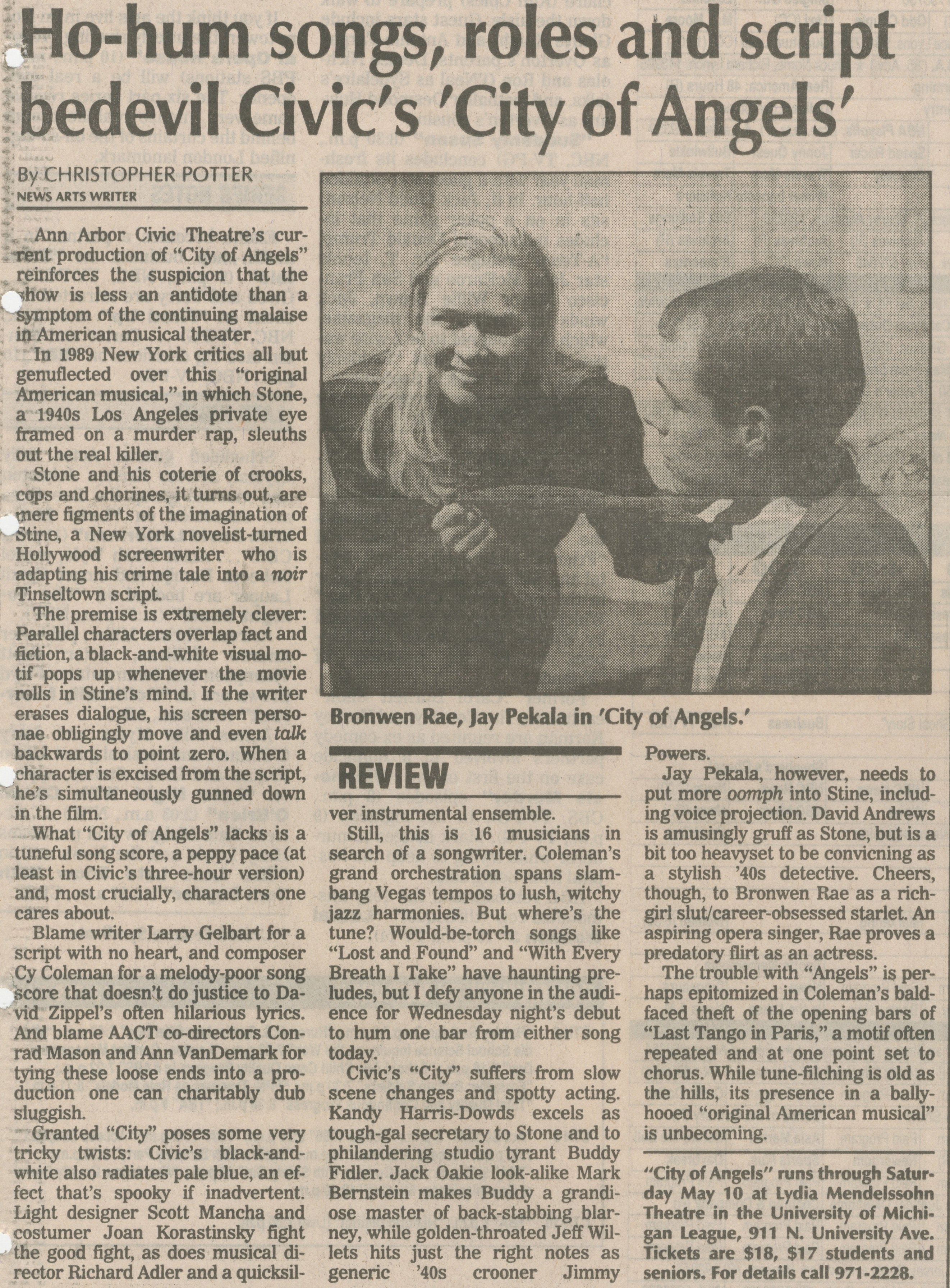Ho-Hum Songs, Roles And Script Bedevil Civic's 'City Of Angels'

Ho-hum songs, roles and script bedevil Civic's 'City of Angels'
Bronwen Rae, Jay Pekala in 'City of Angels.'
By CHRISTOPHER POTTER
NEWS ARTS WRITER
Ann Arbor Civic Theatre’s cur-. Tent production of “City of Angels” reinforces the suspicion that the show is less an antidote than a symptom of the continuing malaise in American musical theater.
In 1989 New York critics all but genuflected over this “original American musical,” in which Stone, a 1940s Los Angeles private eye framed on a murder rap, sleuths out the real killer.
Stone and his coterie of crooks, cops and chorines, it turns out, are mere figments of the imagination of Stine, a New York novelist-turned Hollywood screenwriter who is adapting his crime tale into a noir Tinseltown script
The premise is extremely clever Parallel characters overlap fact and fiction, a black-and-white visual motif pops up whenever the movie rolls in Stine’s mind. If the writer erases dialogue, his screen personae obligingly move and even talk backwards to point zero. When a character is excised from the script, he’s simultaneously gunned down in the film.
What “City of Angels” lacks is a tuneful song score, a peppy pace (at least in Civic’s three-hour version) and, most crucially, characters one cares about.
Blame writer Larry Gelbart for a script with no heart, and composer Cy Coleman for a melody-poor song score that doesn't do justice to David Zippel’s often hilarious lyrics. And blame AACT co-directors Conrad Mason and Ann VanDemark for tying these loose ends into a production one can charitably dub sluggish.
Granted “City” poses some very tricky twists: Civic’s black-and-white also radiates pale blue, an effect that’s spooky if inadvertent. Light designer Scott Mancha and costumer Joan Korastinsky fight the good fight, as does musical director Richard Adler and a quicksilver instrumental ensemble.
Still, this is 16 musicians in search of a songwriter. Coleman’s grand orchestration spans slam-bang Vegas tempos to lush, witchy jazz harmonies. But where’s the tune? Would-be-torch songs like “Lost and Found” and “With Every Breath I Take” have haunting preludes, but I defy anyone in the audience for Wednesday night’s debut to hum one bar from either song today.
Civic’s “City” suffers from slow scene changes and spotty acting. Kandy Harris-Dowds excels as tough-gal secretary to Stone and to philandering studio tyrant Buddy Fidler. Jack Oakie look-alike Mark Bernstein makes Buddy a grandiose master of back-stabbing blarney, while golden-throated Jeff Willets hits just the right notes as generic ’40s crooner Jimmy Powers.
Jay Pekala, however, needs to put more oomph into Stine, including voice projection. David Andrews is amusingly gruff as Stone, but is a bit too heavyset to be convincing as a stylish ’40s detective. Cheers, though, to Bronwen Rae as a rich-girl slut/career-obsessed starlet. An aspiring opera singer, Rae proves a predatory flirt as an actress.
The trouble with “Angels” is perhaps epitomized in Coleman’s bald-faced theft of the opening bars of “Last Tango in Paris,” a motif often repeated and at one point set to chorus. While tune-filching is old as the hills, its presence in a ballyhooed “original American musical” is unbecoming.
"City of Angels" runs through Saturday May 10 at Lydia Mendelssohn Theatre in the University of Michigan League, 911 N. University Ave. Tickets are $18, $17 students and seniors. For details call 971-2228.